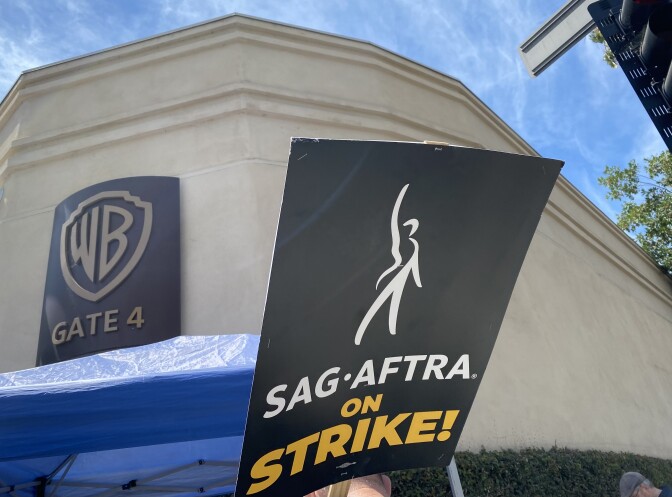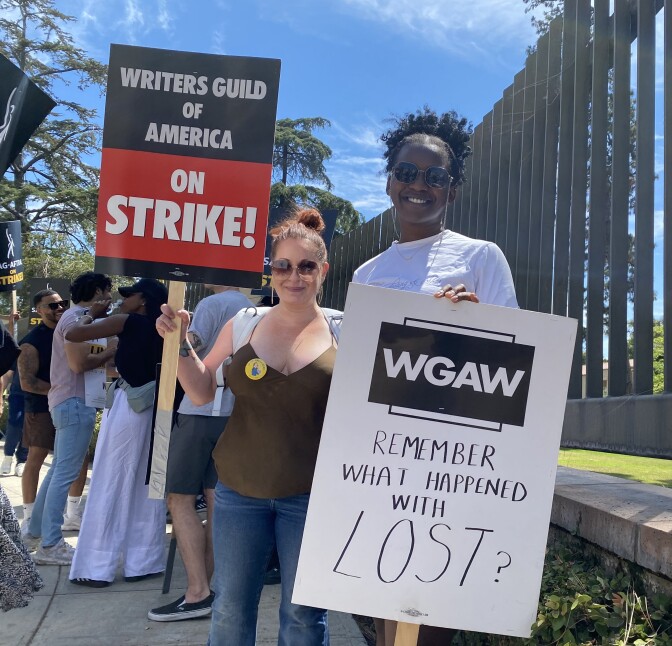This story is free to read because readers choose to support LAist. If you find value in independent local reporting, make a donation to power our newsroom today.
On The Picket Lines, Divided Opinions Among Actors And Writers On Production Waivers

Hundreds of actors and writers in support of the actors union (SAG-AFTRA) and writers union (WGA) strikes are on the picket lines — but not all of Hollywood is shut down. Dozens of independent productions have been given the okay by SAG-AFTRA to continue shooting.
The “interim agreements” pertain to productions that are not affiliated with the Alliance of Motion Picture and Television Producers (AMPTP) and it requires producers to abide by the terms SAG-AFTRA is seeking from the AMPTP.
According to The Hollywood Reporter, there are at least 40 productions that have been granted waivers, including the forthcoming comedy “Bride Hard” starring Rebel Wilson and the drama “Mother Mary” starring Anne Hathaway.
As the WGA strike surpassed the 50 day mark and the SAG-AFTRA strike turned a week old, picketers outside the Warner Bros. lot in Burbank on Friday had differing opinions on whether those productions should continue.
Writer Dawn Garcia, who was close to earning WGA membership before the strike began, said she thinks the indie productions should pause like all the rest.
“I think that in true solidarity, if we don’t stand up for one another, we’re going to end up in the same position every single time,” Garcia said.
Ashley Gianni disagreed. “As an independent film producer, I am so grateful that our unions are in support of our independent film community,” the SAG-AFTRA member said.

“The fact that myself and my other independent film producers, actors, writers, that we still get to tell our stories right now... It’s a really, really important time for us to be making those independent films,” Gianni added.
Overall, there was a strong showing of solidarity among SAG-AFTRA and WGA members, as both unions continue to push for what they see as fairer pay and benefits.
“This is something that everyone is out in full force for because we don’t want to be out here forever,” said actor James Mathis III as he held his SAG-AFTRA sign high.
Timeline: SAG-AFTRA strike
Some things to note: This is the first SAG strike since 1980. The 1960 strike, which took place while the WGA was also striking, was led by Ronald Reagan, then the president of SAG. Current events:
- May 17: Union leaders ask for and receive a strike authorization vote ahead of contract talks.
- June 7: SAG-AFTRA begins negotiations with the AMPTP; contract due to end June 30.
- June 30: Both sides agree to extend talks through July 12.
- July 12: Federal negotiator is brought in
- July 13: The national board of SAG-AFTRA authorizes its 160,000 members to go on strike.
- July 14: Picketing begins at 9 a.m. at major studios and streamer HQ’s across the city.
Timeline: WGA strike
Some things to note: It is the first WGA strike in 15 years. The last work stoppage began in November 2007 and lasted 100 days. Current events:
- April 18: 98% of WGA members vote to go on strike if the contract talks fail.
- May 1: WGA contract expires with no agreement between sides.
- May 2: WGA strike begins
The issue: Actors
Minimum earnings: SAG is asking for an 11% general wage increase to reflect inflation. The AMPTP is countering with 5%.
Share of revenue: Actors feel they haven’t received their fair share of revenue from hit streaming shows.
- Traditionally compensation has been linked to ratings. Streamers like Netflix, however, don’t release how many people watch their shows, so it’s difficult to know which ones are major hits. SAG-AFTRA proposed bringing in a third-party company to measure ratings and devise residuals. The AMPTP rejected this.
- Executives at studios and streamers maintain they’re still recovering from pandemic losses and have spent billions of dollars creating and buying content for new streaming platforms, some of which are far from profitable.
- While some streamers are thriving (Netflix recently reported $1.71 billion of quarterly operating income), The Walt Disney Co. has announced the firing of 7000 employees to save money, having lost close to $10 billion to date on its streaming platforms. Warner Bros. Discovery is making deep cuts because of its $50 billion in debt.
Artificial intelligence: There is deep concern about how artificial intelligence will be used, with particular anxiety about the use of a performer’s image and likeness. The union wants to prevent studios from training AI programs on actors’ work without permission, and for actors to consent and be paid if AI is used to replicate them. The AMPTP offered what it called a groundbreaking proposal that it said “protects performers’ digital likenesses." The union rejected this.
Self-taped auditions: Since the pandemic, self-produced audition tapes have become the norm — meaning actors light and film themselves. It’s labor intensive, with no pay, and widens an already competitive pool of performers. The union says it understands self-taped auditions can be useful, but wants to put restrictions around them.
- Read SAG-AFTRA’s summary of negotiation points
- And what the AMPTP has to say about the negotiations
The issues: Writers
Maintaining a liveable wage: The WGA says that companies’ business practices have “slashed our compensation and residuals and undermined our working conditions”, and that the current contract terms failed to anticipate the explosive growth of streaming.
- It says that most of its nearly 12,000 members are making less than they once did, and that after factoring for inflation, average WGA pay has actually dropped 14% over the last five years.
- Meanwhile the AMPTP says it’s offering the highest first-year general wage increase in more than 25 years, while also offering to create "an entirely new category of rates that will establish a new and higher floor for mid-level writers’ compensation”.
"Gig economy": The union says that shorter schedules and small writers room means writers have to cobble together jobs, similar to the gig economy. The AMPTP says screenwriting has almost nothing in common with standard "gig" jobs. Writers often have a guarantee of specific weeks or episodes, and writing jobs come with benefits such as employer-paid health care and pension plan contributions.
Staffing and duration of employment: The union wants a minimum number of weeks on a project, and a certain number of writers. The AMPTP sees this essentially as a hiring quota that's "incompatible with the creative nature of our industry", and says it's a one-size-fits-all solution to shows that are each unique.
Artificial Intelligence: Writers want to make sure that AI isn’t used to replace their creative output. Meanwhile the AMPTP says "AI raises hard, important creative and legal questions for everyone. For example, writers want to be able to use this technology as part of their creative process, without changing how credits are determined, which is complicated given AI material can't be copyrighted. So it's something that requires a lot more discussion, which we've committed to doing."
- Read the full WGA statement
- Hollywood producers released a statement on May 4 that addressed specific points of the WGA's concerns.
Why it matters
What you’ll be watching:
- Ahead of the WGA contract’s expiration, studios and streamers stockpiled scripts so they would have content to produce if there were a strike. But now the actors are on strike, even that content cannot be filmed, and some productions have been cancelled mid-shoot. Expect game shows, talk shows, docu-series and reality shows in the fall (which are covered under different contracts).
- Companies like Netflix release series in multiple languages, however, so their production schedules often run many months ahead of traditional TV networks, which means they tend to have a bigger shelf of completed shows.
- Movies have a fairly long lead time, so almost all of the movies due to come out through the end of the year have already finished filming. Movies that were slated to begin production soon and come out next year or later are being pushed back, like Gladiator 2 and Deadpool 3.








